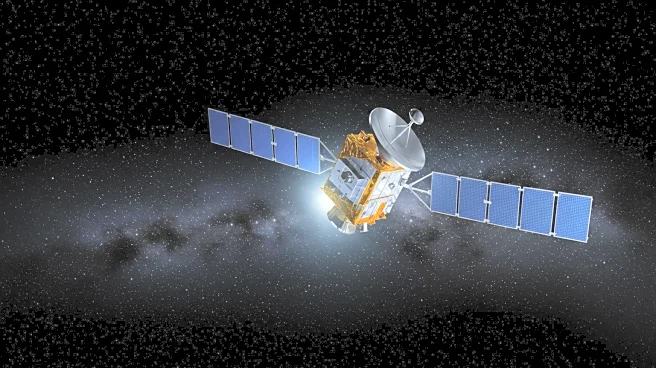What's Happening?
A recent cyberattack on a satellite providing television services to Ukraine has highlighted the vulnerabilities in satellite security. Hackers supporting Russia hijacked the satellite, broadcasting footage of Russia's Victory Day parade to Ukrainian viewers. This incident underscores the growing threat of cyber warfare extending into outer space, where disabling a satellite can cause significant disruptions without physical conflict. Satellites play a crucial role in communications, military operations, and navigation systems, making them prime targets for cyberattacks. The U.S. has declassified information about a potential Russian space-based weapon capable of destroying satellites in low-Earth orbit, raising concerns about national security and the militarization of space.
Why It's Important?
The hacking of satellites represents a significant threat to national security, as these devices are integral to military readiness, economic supply chains, and intelligence gathering. The potential deployment of space-based weapons by Russia could lead to severe economic and military vulnerabilities for the U.S. and its allies. This development could also trigger a new arms race in space, with countries vying for dominance over satellite technology and extraterrestrial resources. The U.S. Space Force, established to protect American interests in space, faces increasing pressure to address these threats and maintain technological superiority.
What's Next?
The U.S. is likely to intensify efforts to secure its satellite infrastructure and develop countermeasures against potential space-based threats. Lawmakers, such as Rep. Mike Turner, are advocating for classified briefings on these issues to ensure preparedness. Additionally, the U.S. may accelerate its space exploration initiatives, including plans to establish a nuclear reactor on the moon, to secure strategic advantages over rivals like China and Russia. The international community may also engage in diplomatic efforts to prevent the militarization of space and uphold treaties prohibiting weapons of mass destruction in outer space.
Beyond the Headlines
The competition for space dominance could lead to ethical and legal challenges, particularly concerning the exploitation of lunar resources and the potential for conflicts over extraterrestrial territories. The race to harness energy sources like helium 3 on the moon could redefine global power dynamics, with countries that control these resources gaining significant geopolitical leverage. The integration of artificial intelligence in space exploration further complicates the landscape, potentially accelerating technological advancements and altering traditional military strategies.








